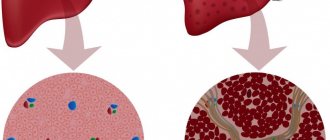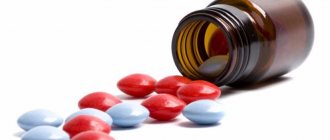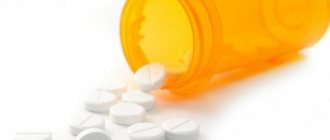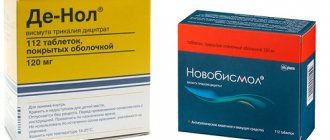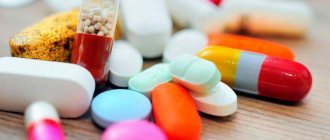Etiology of the disease
There are several reasons for using these medications:
- kidney disease;
- diseases of the cardiovascular system;
- hypertension;
- intoxication.
Pathologies of the urinary or cardiovascular system precede sodium retention in the body, which provokes the formation of edema. As a result of treatment, excess sodium is effectively removed, and swelling is noticeably reduced.
Excess sodium increases vascular muscle tone. As a result of their narrowing and contraction, blood pressure increases significantly. Taking water-removing medications has the opposite effect: the blood vessels dilate and the pressure decreases.
Diuretics significantly alleviate a person’s condition during intoxication.
To do this, the patient is injected intravenously with a certain volume of solution, and then a potent medication. Over time, toxic substances are removed from the body along with the fluid.
List of drugs
The most powerful diuretic
Today there are many different diuretics. They are prescribed depending on the cause of edema. Therefore, there is no best universal medicine that will help get rid of all types of edema. So, if the cause of fluid retention in the body is cerebral edema, then the most powerful diuretic that will help is called “Mannitol”. For high blood pressure, doctors prescribe a good medicine, Ethacrynic Acid. Also, the effectiveness of the product depends on the desired result of its use. Instructions for use and consultation with a doctor will help you understand in what situations it is necessary to use this or that product.
Safe diuretics
Diuretics that give mild and mild effects are, first of all, folk diuretics for edema. These include tea, herbal medicine, or natural tablets. Gentle tablets "Fitonephrol" are one of the most popular drugs. It has an anti-inflammatory and diuretic effect on the kidneys and urinary system. Uriflorin tablets contain bearberry leaves, which are used for urinary tract infections. Safe diuretics are also of synthetic origin. These include Furosemide and Torasemide. These are drugs from the group of loop diuretics. Among the thiazide diuretics, several mild ones are distinguished. The best among them are Chlorothiazide and Metolazone. Potassium-sparing diuretics Spironolactone and Amiloride also have a mild and mild effect on the body.
Actions of drugs
The drugs have the following effects:
- Normalizes blood and intracranial pressure . Thanks to the removal of excess water, balance is restored and a person’s well-being improves. The effect lasts for a long period of time.
- Prevents epileptic seizures . This occurs due to the inhibited action of neurons.
- Protects the kidneys and heart . Some medications have a protective function; they relax muscle muscles and relieve spasms.
- Improve microcirculation . After taking the drug, the level of calcium in the blood decreases, but the amount of magnesium remains unchanged. This improves microcirculation in the kidneys and heart, which protects the organs from unwanted stress and complications.
- Cleanse the body of toxic substances . They significantly alleviate the patient’s condition and effectively remove toxins.
Possible harm
Side effects from taking diuretics occur with prolonged use, if the root cause of edema is incorrectly determined and if there are existing contraindications. Strong diuretics are more likely to cause harm than others. The most common side effects include imbalance of substances in the body, increased cholesterol levels in the blood and sleep disturbances. Some diuretics lead to potency in men and menstrual irregularities in women. To minimize side effects, it is better to consult a doctor and then strictly follow all his recommendations.
Classification, brief instructions and contraindications
Classification of drugs is carried out depending on the mechanism of action and origin. In the first case, the following types of drugs are distinguished:
- Potent . They are used in emergency cases to obtain an immediate effect - lowering pressure, their effect is detected immediately.
- Intermediate level . They have a long-lasting effect and are used in periodic courses in complex therapy for the treatment of heart and kidney diseases.
- Weak action . Characterized by the fact that they retain potassium in the body and control the amount of fluid.
Depending on the origin there are:
- Chemical compositions . A variety of powders, tablets and solutions for intravenous administration.
- Natural medicines . This category includes teas, herbal infusions, and food products.
Strong drugs
The group is complemented by loop diuretics containing fast-acting components. The effect is detected within 15-30 minutes after using the product and persists, depending on the name of the drug, for 2-8 hours. The use of PD affects hemodynamic parameters; they affect the functioning of the respiratory system and reduce the volume of fluid in the cells. In combination with other medications, they are prescribed to patients with renal failure or diseases of the cardiovascular system in emergency cases.
- Furosemide. It is taken on an empty stomach so that the drug works faster. This usually happens after half an hour or an hour. Intravenous injections have a higher reaction rate, the effect is detected after 5 minutes. Within a few hours, the medicine is half eliminated from the body.
- Torsemide. Unlike the previous drug, it has a longer period of action. A long-lasting therapeutic effect is not the main advantage of the drug; it ensures the preservation of potassium and is especially effective for kidney problems.
- Bumetanide . It is characterized by a rapid diuretic effect and is effective for hypertension and edema caused by chronic kidney diseases.
- Piretanide . A highly effective drug, it is prescribed as an antihypertensive agent in monotherapy or in combination with other drugs. It affects the rate of blood clotting and is prescribed for edema, chronic heart and kidney diseases.
- Ethacrynic acid . It is prescribed for edema of any origin; very often it is combined with Furosemide. It is strictly forbidden to take in case of anuria, oliguria, hepatic coma and acid-base balance disorders.
The use of these drugs provokes the removal from the body of microelements such as magnesium, sodium, chlorine, calcium, therefore other medications are prescribed to replenish the reserves of useful substances.
Low potency diuretics
This group includes potassium-sparing drugs, the effect of which is observed over a long period of time. Competent specialists combine these medications with other urinary agents to obtain a complex medicine that guarantees effective treatment. Typical representatives of this group are the following funds.
- Spironolactone . The effect is noticeable within 3-5 days after starting use, and after discontinuation it lasts for another couple of days. It cannot be used as an immediate antihypertensive agent, since it acts only after 14-15 days. Prescribed for the treatment of arterial hypertension, as well as to reduce periodic edema. Side effects of this steroid drug are: hormonal imbalance, gynecomastia, and the appearance of excessive hairiness of the skin.
- Triamterene . It acts within a few hours after administration, the effect lasts for 13-15 hours. In older people, unwanted effects may occur in the form of potassium deposits and kidney damage. The urine of such patients changes color and becomes blue-blue.
- Amiloride . Potassium-sparing drug , used comprehensively for the treatment of heart disease and arterial hypertension.
Diuretics for hypertension
Treatment with diuretics for pressure changes, thiazide diuretics have become especially popular. They differ from loop ones in that they retain reserves of microelements in the body and have a long-lasting therapeutic effect, at least 18 hours.
Taking these medications does not cause discomfort to the patient, since the process of removing fluid from the body occurs naturally, without the need to frequently visit the toilet. The effect is achieved by blocking the reverse transport of chlorine and sodium, as a result, the amount of extracellular fluid and blood pressure are noticeably reduced.
- Hydrochlorothiazide . Taken 1-2 times a day after meals, can be prescribed for periodic or long-term use. To reduce the risk of unwanted effects, Hydrochlorothiazide should be taken after meals. During treatment, the patient is recommended to follow a diet enriched with potassium and reduce daily salt intake.
- Indapamide. It has not only a hypotensive, but also a diuretic effect. Protects the cardiovascular system, does not affect the condition of the kidneys and does not change the lipid spectrum. Weak diuretics for the treatment of hypertension are prescribed in combination therapy with other, more effective drugs.
Use of diuretics during pregnancy
In case of severe edema and to make her feel better, a pregnant woman is prescribed medications that help remove water from the body. Diuretic drugs should not be taken without consulting a doctor; only he, after conducting certain studies, will prescribe the correct dose and frequency.
Herbal products are the safest, among them the following can be noted:
- orthosiphon leaf;
- birch buds and leaves;
- lingonberry leaf;
- horsetail;
- cornflower flowers;
- cranberry or lingonberry juice;
- carrot juice.
Medicines for swelling
Water retention in the body indicates the development of pathology of internal organs, vascular insufficiency or impaired lymphatic drainage, therefore, before starting to use any medicine for the kidneys, you should consult a doctor for help and undergo an appropriate examination.
To remove excess fluid from the body, loop, osmotic, thiazide, and potassium-sparing drugs can be used. Preparations of natural origin have the mildest effect on the body. It is preferable to use weak diuretics for edema.
What to do with swelling
Any swelling is not a disease, but only a symptom that sometimes indicates quite serious illnesses.
It is possible with some degree of probability to guess what is causing the swelling in a particular part of the body.
• Loose swelling on the face retains pressure for a long time, appears in the morning and subsides slightly in the evening, accompanied by pallor - kidney problems.
• By the evening, the legs swell, the neck veins swell, there is shortness of breath and cyanosis of the extremities - heart disease.
• A feeling of heaviness and pain in the legs, accompanied by redness of the feet and swelling, which increases in the evening - varicose veins.
• The anterior abdominal wall swells, spider veins appear on the skin of the abdomen, itching occurs - ascites, a condition associated with serious diseases and requiring urgent medical attention.
• Redness and pain in the joints, accompanied by swelling - arthritis, gout.
• Rapid swelling, redness and itching of the skin, runny nose, sneezing or coughing, sore throat - an allergic reaction. A life-threatening condition that requires urgent medical attention is Quincke's edema. With it, literally within a few minutes, the lips, eyelids, cheeks swell, but the worst thing is the larynx and tongue, which leads to severe difficulty breathing.
How to deal with swelling? It all depends on their reason. In any case, it is not enough to simply get rid of swelling; you must immediately begin treatment for the underlying disease that caused it. For cardiac, renal, venous and hepatic edema, excess fluid can be removed using diuretics. They must be used very carefully so as not to cause the leaching of beneficial salts from the body, especially potassium and magnesium, which are necessary for the functioning of the heart. Allergic and inflammatory swelling is relieved by taking antihistamines and anti-inflammatory drugs. But all these remedies fight only one of the manifestations of the disease, and do not cure it. Therefore, swelling cannot be ignored!
These remedies can help with swelling
The forest mermaid will relieve swelling
If you have not been able to find out the cause of edema, then try to resort to the help of such a universal plant as sageweed. Cupyr strengthens the walls of blood vessels and has a strong diuretic effect. The plant will help you forget about the diuretics that you take to eliminate swelling.
The name of the plant seems unusual. But each of us has met him more than once in the forests or meadows. It’s enough to look at any reference book on herbs and see an image of sageweed to say: “Yes, I know it well!” Root decoction: brew 1 tbsp. l. raw materials with 1 cup of boiling water, boil in a water bath for 30 minutes, leave for 20 minutes, strain through 2-3 layers of gauze and bring the volume with boiled water to the original volume. Take 1 tbsp. l. 3 times a day 30 minutes before meals. Young marigold leaves can be added to salads. But before using, it is better to soak the leaves of mature marigold in boiling water for 1-2 minutes.
Garlic for swelling
You may not like this recipe, but it is a very effective remedy for swelling. Crush the head of garlic to obtain a homogeneous mass. Add a small amount of urine to it and rub the whole body with this mixture. Put on cotton pajamas and go to bed. Do the procedures at night, because... The product begins to act after 6 hours. This remedy removes fluid in the usual way, acting as a diuretic, but it also removes it through the skin in the form of sweat. 3 procedures are enough and the swelling will subside.
Pumpkin juice will help with puffiness under the eyes
Pumpkin juice with honey helps with puffiness under the eyes. To do this, just drink ½ glass of pumpkin juice with a teaspoon of honey before going to bed.
Collection for edema
The following collection helps with swelling: collection: agrimony (1 part), gray jaundice (2 parts), horsetail (1 part), bedstraw (0.5 parts), cress (2 parts), annual immortelle (1 part), oats (3 parts), Leuzea safflower, root (1 part). Pour one tablespoon of the mixture into 0.5 liters of boiling water. Leave for 2 hours. Take 1/3 cup 4 times a day.
For dropsy and cardiac edema
For dropsy and edema of cardiac origin: mix rose hips (10 parts), spikelets of oats (10 parts), flax seeds (5 parts) and chicory root (5 parts). Grind the mixture in a coffee grinder. Then 1 tbsp. Pour a spoonful of the mixture into a glass of boiling water and leave in a thermos for 6 hours. Strain and take 3 times a day, 1/3 cup, 30 minutes before meals.
Herbs for swelling
Take 1 tbsp. spoon of plantain leaves, calamus root, arnica and calendula flowers, mix them with 50 g of chestnut flowers. Pour the mixture in the amount of 5 tbsp. spoon 5 cups of water and boil for 5 minutes. Soak gauze strips in the liquid and apply to the swollen areas for a while, 2 times a day.
If your legs swell
Charger
• When you get home, remove all clothes that are tight (with elastic bands). Stretch on the floor. Spread your feet to the sides, relax your arms, turn your palms up. Take a few deep breaths in and out.
• Without lifting your back from the floor, bend your legs and pull your knees to your chest, helping yourself with your hands. Stay in this position for several minutes.
• Raise your legs at right angles. Slowly bend and extend your toes upward. Bring your legs together and spread them, lightly hitting your calves together. Make a “candle” (“birch tree”), helping yourself with your hands.
Massage
• Using smooth sliding movements, massage your legs from the ankles up, along the calves and thighs.
• Relax your calf muscles by gently and very slowly kneading them with your fingers.
• Shake your legs one at a time.
How to reduce swelling
The use of adonis, as well as medicinal plants that have a diuretic effect - knotweed grass, leaves and young shoots of lingonberry and bearberry, bedstraw grass, birch leaves, etc., will help reduce swelling in the lower extremities. It is very good, as an affordable and effective means to reduce swelling, to use knotweed and birch leaves as follows: pour 1 teaspoon of the raw material into 200 ml of water. Boil for 15 minutes. Leave for 30 minutes. Drink 1/2 glass in the morning and afternoon, regardless of food.
How to eat when edema?
If the heart cannot cope with the load that is necessary to deliver blood to organs and tissues, if the blood flow is slow and the pulse is frequent and weak, blood retention occurs in the vessels. As a result, some of the fluid penetrates through the walls of the vessels into the surrounding tissues, and edema forms. Under the influence of gravity, fluid moves downwards, so cardiac edema most often occurs in the legs, and in bedridden patients - in the lower back and back.
With such symptoms, apple-curd fasting days will help you. You can only eat 600-800 g of apples and 300-400 g of cottage cheese per day. For large edema, such a diet is prescribed for 5 days.
On other days, don't forget about apples and other fruits and vegetables. They remove water from the body well. It is necessary to eat as much raw cabbage, cucumbers, citrus fruits and berries as possible, such as lingonberries. Stewed, baked or boiled vegetables are healthy, especially pumpkin and potatoes, zucchini and eggplant.
Try to use table salt in minimal quantities - no more than 1.5 g per day.
To improve the taste of foods and prevent swelling, use finely chopped garlic and onions, parsley, cinnamon, ginger and fennel. These seasonings have a diuretic effect.
What folk remedies are used to relieve edema and prevent it?
• Pour in 4 tsp. flaxseed 1 liter of water. Boil for 5 minutes, let the broth brew for 3-4 hours. Then strain and add lemon juice and honey for taste. Take 1/2 cup 5-6 times a day every 2 hours. But don't expect quick results, they will be noticeable in 1-2 weeks.
• Pumpkin and black radish juices with honey have diuretic properties. At first, drink these juices 1/2 glass per day, gradually increasing the daily dose to 1-2 glasses.
• Pass the parsley root and greens through a meat grinder to obtain 1 cup of ground mass. Add 0.5 liters of boiling water to the container with this mass and wrap for 6-8 hours. Then strain, squeeze, add the juice of 1 lemon. The liquid should be drunk in 3 doses during the day. Take this medicine for 2 days in a row, repeat the course after 3 days.
When using diuretics (not only tablets, but also natural products), remember the need to replace the loss of potassium excreted in the urine. Eat foods rich in this substance: oatmeal, rose hips, raisins, rice, dried apricots, etc.
Pumpkin for swelling
To combat swelling, porridge or a heat-treated pumpkin dish will give little results. It is the raw pumpkin pulp that is beneficial. Grind a piece of pumpkin weighing about a kilogram through a meat grinder along with 2-3 sour apples, add a glass of raisins and stir the mixture well. Put it in the refrigerator. Eat a few tablespoons before each meal. Pumpkin is one of the best diuretics that quickly eliminates swelling. It removes not only fluid from the body, but also excess cholesterol and toxic substances. It is important that pumpkin also compensates for the loss of iron, potassium, magnesium, which are necessary for heart health. And the vitamin E contained in pumpkin improves peripheral blood circulation and cures heart failure.
Parsley will relieve swelling
Parsley is the best remedy for edema that occurs due to poor functioning of the heart or kidneys.
The washed roots and parsley must be passed through a meat grinder. Then pour 1 cup of the resulting mass with 2 cups of boiling water and leave for 12 hours. Strain through 3-4 layers of gauze and add juice squeezed from 1 lemon. Take 2 times a day, 1/3 cup. Drink for 2 days, then take a break for 3 days. Continue this way until the condition improves and the severity of swelling decreases.
But you need to take into account that parsley, having a diuretic effect, removes a lot of potassium from the body. And therefore, on the days of taking this remedy, you should eat oven-baked potatoes (along with the peel!), dried apricots, prunes, raisins, nuts, and honey.
Fighting leg swelling
Pour 1 liter of water 4 tbsp. l. flaxseed, place on the stove and boil for 10-15 minutes. Then close the pan with a lid and leave, let it brew for 1 hour. The broth does not need to be filtered. For taste, you can add lemon or any other freshly squeezed juice. Take 0.5 tbsp hot. every 2 hours 6-8 times a day. The result will be visible within 2-3 weeks.
Oats are a diuretic
For urinary retention (diuretic) Drink 1 tbsp three times a day. decoction of oat straw. Pour 40 g of straw into 1 liter of boiling water, boil for 10 minutes, strain.
Quince for swelling
Take 500 g of quince, finely chop and pour 1 liter of hot water, boil for 20 minutes. strain. Take 1/2 tbsp. 3 times a day before meals.
Natural Diuretics
A properly formulated diet is one of the ways to combat unwanted edema. There are food products that have a diuretic effect, it is recommended to organize daily consumption of the following products:
- melons;
- watermelon;
- cucumbers;
- pineapple;
- parsley;
- dill;
- celery;
- baked potatoes.
Instead of regular tea, you can consume teas, which include the following components:
- flax seeds;
- bearberry;
- burdock;
- chicory;
- juniper;
- rose hip;
- birch leaves.
Well, if the gifts of nature do not have the desired effect, then it will not be possible to avoid taking synthetic diuretics.
Side effects of Spironolactone
- dizziness;
- loss of appetite;
- nausea or vomiting (occurring with a significant overdose of the drug);
- pain in the abdomen;
- intestinal colic;
- gastritis or stomach ulcer;
- increased drowsiness;
- headache;
- lethargy;
- local allergic reactions (skin itching, urticaria);
- soreness of the mammary glands.
If any of the above side effects occur after using this product, it is recommended to consult your doctor!
In this article, we found out what Spironolactone helps with, as well as how to drink it correctly.
1 comment
Side effects
Long-term use of diuretics cannot but affect the general condition of the body. In addition, incorrect prescription or dosage of the drug can cause a number of unpleasant consequences:
- skin rashes;
- dry mouth;
- drowsiness;
- diarrhea;
- dizziness;
- muscle spasms;
- arrhythmia;
- coordination problems;
- hearing impairment;
- thrombosis;
- formation of kidney stones;
- male impotence;
- menstrual irregularities;
- renal and heart failure;
- increased blood sugar;
- pulmonary edema;
- cirrhosis of the liver.
To avoid such negative manifestations, it is unacceptable to independently decide to take any diuretic drug.
Before starting treatment, you should definitely contact a qualified specialist and undergo an appropriate examination.
The use of diuretics is allowed only as prescribed by a doctor.
Pros and cons of using diuretics for edema
Loop diuretics
This type of diuretic begins to act faster than others. Therefore, if it is necessary to remove some fluid from the body in a matter of hours, doctors prescribe them. The names of loop diuretics that show the most effective effect are “Furosemide”, “Torasemide” and “Ethacrynic acid”. Diuretics are used for heart and kidney failure in acute and chronic phases, high blood pressure, cerebral edema and elevated calcium levels in the blood.
The advantage of using such diuretics is that they do not affect blood sugar levels or cholesterol. They are also able to lower blood pressure and relieve vasospasm. Disadvantages include possible dehydration, hearing loss, and tinnitus. A sharp drop in calcium, magnesium and sodium levels in the blood is also possible.
Thiazide
The main advantage of thiazide diuretics is their duration of action. Thus, the effect occurs 2-3 hours after administration and lasts for 12-14 hours. In addition, the use of thiazide diuretics has no restrictions on the patient's salt intake. Therefore, they can be used for heart failure. If diuretics of this group are taken incorrectly, a sharp drop in potassium levels in the blood occurs, as well as nausea, vomiting and prolonged diarrhea. It is dangerous to prescribe thiazide diuretics to people with diabetes. Thus, a patient who took drugs of this group experienced an increase in blood glucose levels.
Potassium-sparing
This group of diuretics is considered the least effective. The result of their use occurs only after a few days of use. Therefore, potassium-sparing diuretics are prescribed simultaneously with loop or thiazide diuretics. The main task of such diuretics is to prevent potassium from leaving the body along with urine. They are usually prescribed for the treatment of high blood pressure. Potassium-sparing drugs have a number of disadvantages. First of all, there is a high risk of getting an increase in potassium levels in the blood, which is dangerous for people with diabetes and heart failure. In addition, women may experience disruptions in the menstrual cycle, and men may experience impotence.
What foods cause a diuretic effect?
For those who want to remove excess fluid from the body in a gentle and gentle way, without using medications, products with a diuretic effect are suitable. Eating such foods or dishes made from them will significantly reduce the fluid content in the tissues.
The following products are considered diuretics:
- watermelons, melons, pumpkins;
- green tea;
- oatmeal;
- kefir;
- beets (beet juice is especially effective);
- White cabbage;
- prunes, raisins and dried apricots;
- spices (cumin, fennel);
- greens (dill, parsley), horseradish;
- cucumbers, potatoes, eggplants, asparagus;
- cherries, cranberries and lingonberries.
They can be eaten raw, made into smoothies and juices, boiled, baked, or stewed. You can combine several products, or you can eat them separately. Some of them (cabbage, prunes, kefir, oatmeal) not only remove excess fluid, but also normalize digestive processes.


